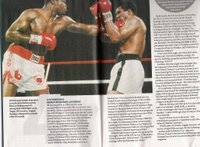
 Asked in the January issue of Vanity Fair (page 164) which living person he most admires, the author Norman Mailer answers: Muhammad Ali.
Asked in the January issue of Vanity Fair (page 164) which living person he most admires, the author Norman Mailer answers: Muhammad Ali.Ali features again in words and images on pages 128 and 129 of the same issue, in an in-depth piece about the groundbreaking new journalism of Esquire Magazine in the 60s. The magazine featured on its December 1963 cover the former world heavyweight boxing champion Sonny Liston - as Santa Claus. Liston-as-Santa had been a very controversial decision on the part of Esquire magazine back in the day. An ex-convict whose links to organised crime were more than mere allegations and who was an embarrassment to the civil rights movement, is described by one Esquire staffer as "'the baddest motherf---er' ever kissed by fame". He would provide the publication with what they described years later as "the perfect magazine cov
 er."
er."Even more famous, is the cover from April 1968 (VF regals us with images from the photo shoot) showing Muhammad Ali - fresh from losing his heavyweight crown for refusing to go to Vietnam - 'martyred' as Saint Sebastian. The cover was still on the stands when Martin Luther King Jr was martyred for real by an assasin's bullet in Memphis.
I bought The Observer today principally because the Sports Monthly magazine was going to list for us their 50 Most Heartbreaking Moments in Sports. Number 4 is Muhammad Ali's defeat by Larry Holmes on 2nd October 1980 in Las Vegas (I saw this match live on television as a kid in Los Angeles, and yes, it was like seeing a titan fall). Thomas Hauser, who wrote the piece, reminds that "Muhammad Ali in 1980 was the most recognisable, and possibly the most loved, man on earth."
Of the bout that proved the undoing of The Greatest, Hauser writes: "It was a horrible night. Ali was a shell of his former self. He had no reflexes, no legs, no punch. Nothing, except his pride and the crowd chanting, 'Ali! Ali!'. By the time Ali's trainer Angelo Dundee stopped the fight after ten rounds, "An era in boxing - and an entire historical era - was over."
George Foreman describes elsewhere in the magazine his own heartbreaking moment - and i t again involves Ali. This time, it was his loss to Joe Frazier in March 1971. Foreman says he was offered a fight with Ali around the same time but turned it down because "I didn't want to see him lose" (to Foreman! a bit presumptuous of Foreman to say this, especially as we'll never know). Still, Foreman reports: "It felt like Alis defeat was a defeat for us all, boxers and fans. We had our hopes invested in him. I was so sad that he had lost his unbeaten record."
t again involves Ali. This time, it was his loss to Joe Frazier in March 1971. Foreman says he was offered a fight with Ali around the same time but turned it down because "I didn't want to see him lose" (to Foreman! a bit presumptuous of Foreman to say this, especially as we'll never know). Still, Foreman reports: "It felt like Alis defeat was a defeat for us all, boxers and fans. We had our hopes invested in him. I was so sad that he had lost his unbeaten record."
Talking of covers, this month's VF's features jiving Eddie Murphy, Jamie Foxx and the inescapable Beyonce Knowles - in a promo of the movie, Dreamgirls. But we'll leave all that aside for now.
There are no Africans in The Observer's 50 most heartbreaking moments. If the death of Marc-Vivien Foe on the pitch during an international match in June 2003 was not heartbreaking, then I don't know what is.










.jpg)





2 comments:
Great info on all the postings but I must display male arrogance here. You felt Foreman was being presumptious by thinking he could beat Ali and deciding not to fight him?
At the time Foreman did this thinking, he was the strongest boxer in the world, and even minutes before Ali entered the ring and defeated him in the "Rumble in the Jungle", not even Ali's handlers thought their charge could take on Foreman.
Ali is truly the greatest. Thank you for memories.
lovely post. Ali is the greatest!
Post a Comment